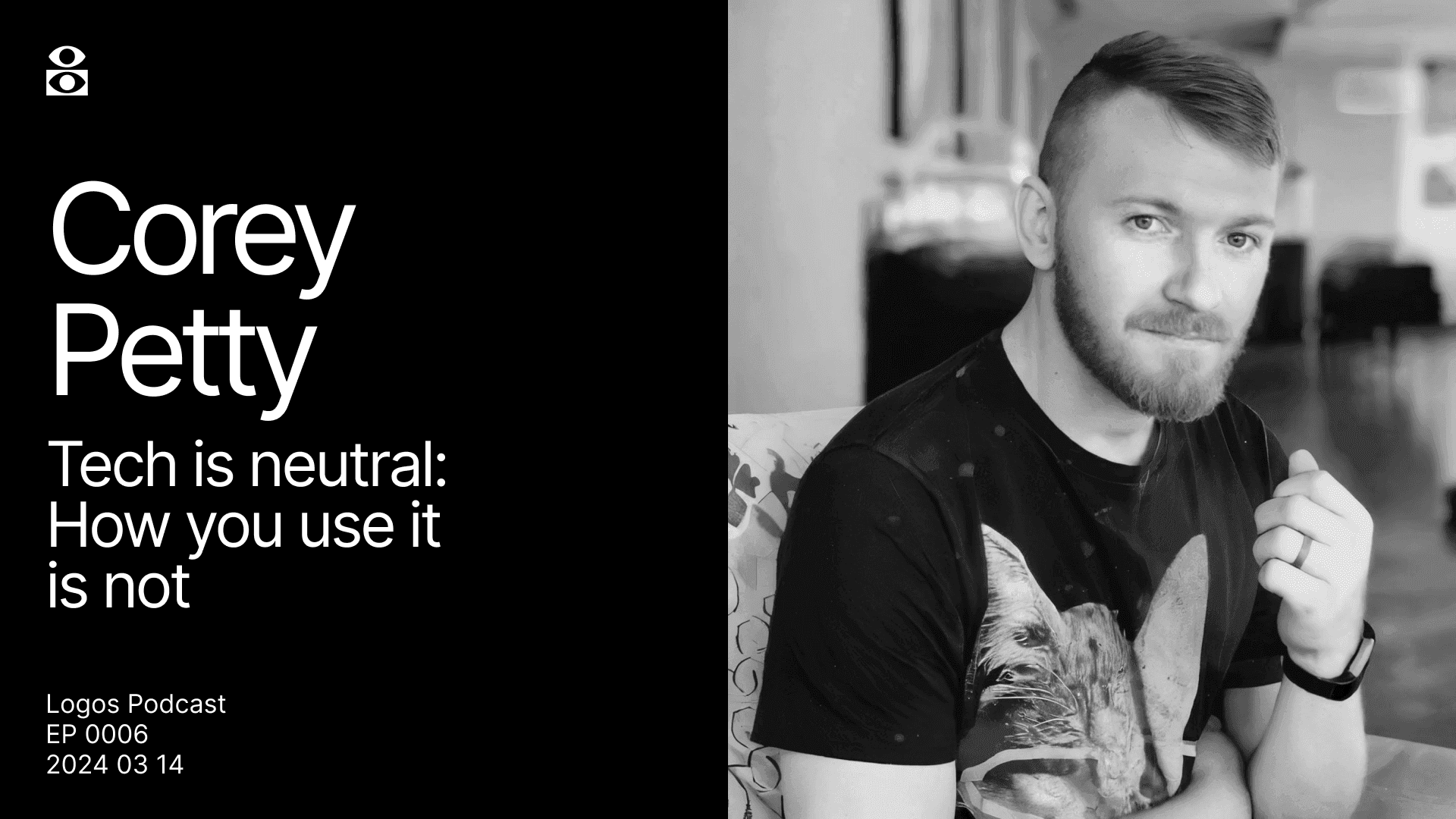

Tech Is Neutral: How You Use It Is Not
In a Logos Press Engine crossover, Jarrad Hope brings Corey Petty - Logos Program Lead & Hashing It Out host - to discuss the political and technological motivations behind their work and their aim of building infrastructure that supports civil liberties and resists centralisation of power, using open-source tech.
They question if the nature of technology is inherently neutral or not, the ethics of building technology, and how it relates to political structures.
Corey Petty
I'm a good portion of the technology building side of this, and I'd say you're more of the political motivation ethics. This is why we're doing this. This is the problem that we see. Uh, instead of doing this, would you think that's reasonable?
Jarrad Hope
Yeah, definitely. I mean. Definitely some overlap there, but yeah.
Corey Petty
Yeah. Jared. So me and you talk quite a bit and the introduction of logos or the thought of how we like how this thing gets built. This, this you you mentioned the concept of politics quite a bit and why this whole logos thing has to be political. Can you kind of go over that a little bit as to like, why, why, why does politics need to be involved in the creation of, of logos or the creation of technology in the first place?
Jarrad Hope
Yeah. I mean, it's a good question. Um. I think like. It depends on how far you you really want to go and which thread you want to go down. Right. So typically, um. This kind of like two main threads that I consider. One is sort of like the post nine over 11 world, um, which kind of came into, uh, sorry, the post 9/11 world where like, you started to see these sort of mass surveillance programs come out. Right. So I think it was like in roughly the early 2000, maybe 2004, where, like Thomas Tamm and Thomas Drake, uh, were effectively like these whistleblowers that um, uh, revealed Stellarwind, which was this sort of one of the first sort of foundational dragnet surveillance, um, spy operations against U.S. citizens, right. And did massive data collection, um, and, uh, you know, this continued or paved the sort of legal foundation for, you know, the Snowden revelations, which came out almost like, what, ten, 12 years later, uh, which was the NSA spy program Prism. Um, and that combined with, say, the Patriot Act basically gave the US carte blanche to collect all data on all people across the entire planet. Um, and those things are still ongoing. Um, another side of that is perhaps, you know, uh, around a similar sort of time, uh, around sort of 2010, 2009, um, and 2011, the sort of rise of like, you know, the Occupy and Bitcoin, um, in which I view both of those as a form of protest for economic freedom and against the sort of financial system or the sort of so-called 1%, um, or um, as you would hear in the Bitcoin community, this notion of like debt slavery, right.
Jarrad Hope
Um, um, through inflation of a fiat currency to the point where, like, your money and purchasing power is not worth anything. Um. So like. You know, one of the issues with that? Well, one of the issues with, say, the surveillance side of things is that, um. You ended up getting into a position where like. Now this data is collected on you. Um. You might be concerned about your privacy, right? Um, but, you know, one of the arguments against that might be saying, well, I've got nothing to hide. And that's like, okay, but there's a broader problem there. And it's, you know, it can be, you know, one way to look at that is, is like how you can potentially be manipulated as a citizen or how does that allow a democracy to, to function. Right. Um, and I think Glenn Greenwald kind of said something to the effect of it's like, if I know every single thing about you, about what you think, how you reason and what your fears are and like, what you're planning and even what you're doing, and you know nothing about me because I'm shielding my behavior behind, like, a wall of secrecy. Uh, then, like, I have a massive amount of power over you, and it's not just you, right? It's the entire population we're talking about. So the sort of power imbalance created, uh, by this sort of technological gap, um, allows a very small minority to influence, uh, human behavior en masse. Uh, and like today, we're starting to see that in, like, censorship of, like, big tech platforms or big tech platforms censoring, uh, individuals.
Jarrad Hope
Uh, and so this starts, uh, suppressing sort of political, uh, political dissidents. Um, anyone who doesn't agree with like an official narrative, um, and say like, um, when it contrasting to say like Occupy and Bitcoin, even though they're fundamentally protesting a similar thing. Uh, you. You. You essentially are a kind of, um, what you can view both bitcoin and, and occupy under sort of Albert Hirschman's notion of exit voice and loyalty. Right. So, um, Albert Hirschman had this sort of ultimatum that you can apply, uh, he was using it for consumer products, but you could apply that with your relationship to the states. Uh, you can either, uh, be loyal to the system, like everything's fine. Uh, you can express your voice or discontent. Um, that's like through protest. Um, or you can exit the system, um, which Bitcoin was trying to do by creating a new, uh, currency, essentially, um, that has better sort of foundational properties, um, that support sort of economic freedom. Um, and has a different monetary policy that is supported by, by the people. So. When it comes to say something like logos. Um. It's really sort of an instantiation of some of the things, ideas that Ethereum got right in the early days. Right? Like, um, this notion of like decentralized applications. Uh, but. They were typically trying to be sort of agnostic towards why this technology actually matters, right? It was more focused on a world computer. Um, but there is actually really strong sort of political reasons why this matters. I don't know if you want to get into that, but like, it's a whole other thing as well.
Episode host - Jarrad Hope
Produced by - Christian Noguera
Edited by - Christian Noguera